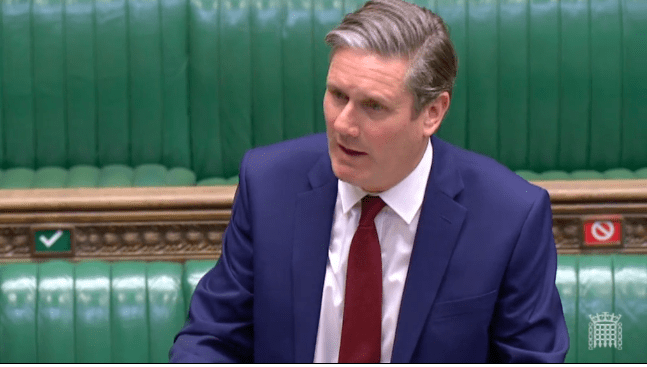A testy, ill-tempered PMQs. Sir Keir Starmer accused Boris of presiding over a corona-shambles. The PM fired back and asked the Labour leader to show ‘signs of co-operation’ with the government’s efforts. Sir Keir was able to cite a ‘sign of co-operation’. A letter written to the PM two weeks ago about helping to reopen schools. He hadn’t received a reply.
‘I’m surprised he should take that tone,’ said Boris aggressively. ‘I took the trouble to ring him up and we had a long conversation in which I briefed him about all the steps we were taking…He thoroughly endorsed our approach.’
Sir Keir sniffed grandly that the letter had been ‘confidential’. And he waved a piece of paper. The letter, presumably. (But if he’d sent it, how come it was still in his pocket?) He announced that this secret communication would now be placed, ‘in the public domain’. Much rehearsal had gone into this spontaneous gesture. He then alleged that the misuse of statistics was eroding confidence in the government. ‘I don’t see the purpose of these endless attacks,’ complained Boris. Sir Keir tried again. The testing regime was a failure, he said, but the PM scolded him for ‘casting aspersions on the efforts of tens of thousands of people.’
Entirely bogus and entirely Boris. He’s pulling a fast one, clearly, by acting as if he were leading a National Unity Government. This sophistry gives him scope for plenty of moral posturing. Every criticism is an ‘attack’. Every challenge is a breach of loyalty. Every complaint is an insult to millions of toiling public servants.
This sham shouldn’t work, unless Sir Keir permits it. The Labour leader must find a means of piercing Boris’s borrowed armour. But he may struggle to do so. He lacks the stamp of an imaginative thinker.
The rave reviews about his ‘forensic’ skills may have persuaded him that his tactics are sound. Many are impressed by his record as a silk and a former leader of the CPS but that isn’t necessarily the view on Middle Temple Lane. Plodders go into the criminal law. The bright, ambitious types (like Tony Blair) practise at the commercial bar. Sir Keir is unlikely to out-dazzle Boris. And the PM made his attitude clear when Jeremy Hunt asked him a complex two-part question about turnaround times for testing. ‘May I congratulate my honourable friend,’ said Boris, ‘on the kind of detailed forensic questioning we could have had earlier.’ That was Boris marking Sir Keir’s homework. Beta minus.
Ian Blackford, of the SNP, delivered the sort of oration that would not have been out of place at Queen Victoria’s funeral. His tone was ominous. His speech cliché-clustered. ‘Watching events unfold across America in recent days – and the actions and the rhetoric of the American president – has been distressing and deeply worrying.’
Not just distressing. Deeply worrying too. Blackford likes to pack the smallest amount of sentiment into the maximum number of words. ‘It is in times like these,’ continued the member for Minnesota, ‘when people look to those they elect for hope, for guidance, for leadership, and for action.’
Blackford has convinced himself that he’s the only parliamentarian with the moral stature and the intellectual prowess to explain US history to the confused and ignorant masses. He probably imagines that half the world tuned in to watch PMQs today because ‘Blackford Live Matters.’ He did at least prompt one ‘action’.
‘Prime minister…at the very least, say it now. Black lives matter.’
Up stood Boris. ‘Of course black lives matter.’
The bigger the balloon the easier it is to pop.







Comments